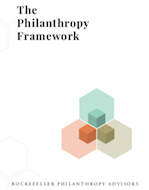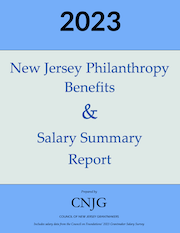Site Search
- resource provided by the Forum Network Knowledgebase.
Search Tip: Search with " " to find exact matches.
Ensures compliance with banking regulations established as part of the Community Reinvestment Act (CRA). Analyzes and reports required data to the federal government and examiners. Initiates, prepares and executes grant applications through the Federal Home Loan Bank. Regularly reviews progress of bank in Lending, Investment and Service Test as it relates to CRA. Develops new business and maintains effective relationships with community leaders in targeted markets. Chairs and prepares for CRA Committee Meetings.

Rockefeller Philanthropy Advisors has released The Philanthropy Framework, a tool for analysis and planning to guide emerging and established philanthropies to better align resources for maximum impact. Created with input from leaders from more than 50 foundations worldwide, the tool seeks to address fundamental changes in philanthropy and the world such as generational shifts in attitudes, massive wealth creation, diversity of capital, new models for impact, and new operating environments among others.
It lays out three core elements for philanthropists to consider when determining how to maximize their impact:
- Charter, the organization’s scope, form of governance, and decision-making protocol
- Social Compact, its implicit or explicit agreement with society about the value it will create
- Operating Model, the approach to the resources, structures and systems needed to implement strategy.
CNJG is pleased to offer this series of webinars to our members, hosted by our partners at the Center for Disaster Philanthropy.
With COVID-19 there seem to be more questions than answers, particularly for funders who want to respond effectively and efficiently. This series of seven webinars will bring expert panelists together to address some of the most pressing issues, including getting money out the door quickly, supporting vulnerable populations and managing other disasters in the midst of the pandemic.
Join the Center for Disaster Philanthropy for one or multiple webinars to gain a better perspective on the role of philanthropy in COVID-19 response and recovery.
Cost: Free for CNJG members and Nonmember Grantmakers
CNJG thanks the Center for Disaster Philanthropy for hosting this series.
Past Webinars in this Series:
April 14: Making Effective Rapid Response Grants
April 28: Managing Multiple Disasters Amid the Pandemic
May 12: Place-based Grantmakers and Investing in Local Communities
May 26: How Philanthropy Can Stand Up for Vulnerable Populations
June 9: Grantmaking to Support Children and Older Adults
June 23: Managing a Global Response

Under-resourced communities are going without because nonprofits can't meet demand. Americans —particularly those in low-income communities—are still struggling to secure jobs, affordable housing, and healthcare. Nonprofit Finance Fund’s 2015 State of the Nonprofit Sector Survey focuses on the underlying causes of these dynamics by exploring the programmatic, financial, and operational issues facing nonprofits across the U.S.
NFF launched the Survey in 2008, when economic crisis threatened the viability of many organizations. Seven years later, results from 5,451 respondents show some indications of recovery, stabilization, and growth. Nonprofits are adding jobs, engaging in strategic conversations such as leadership succession planning, and looking to retain their workforce. Yet as they raise their sights from the focus on short-term crisis, many are confronting the troubling reality that current practices cannot sustain organizations in the long-term or meet the needs of the communities they serve now. Many organizations have stumbled out of crisis looking to make the necessary investments to secure their long-term future. And it is a hard road ahead.
The rise of ESG and the SEC's impending climate disclosure requirements has put increasing pressure from the investment community on companies to meet specific reporting requirements. In addition, employees, communities and customers are demanding that companies address their concerns on a wide range of social and environmental issues. The growing number of reporting standards and frameworks can make it difficult for CSR and Philanthropy professionals to determine the best approach to reporting on their company's efforts.
This session will provide concrete ideas and steps on how to create an effective impact report that balances competing demands from a range of stakeholders. Specifically, how do companies acknowledge the tension between the need to meet a particular reporting requirement and authentically reporting on the relationships with the community? Within these structures that they can’t change, what are their choice points for more equitable practices?
Cost: Free for CNJG Members; $150 for Non Member Grantmakers
This program is only open to staff and trustees from grantmaking organizations.
This program is presented by Philanthropy New York.
This brief from Grantmakers Concerned with Immigrants and Refugees (GCIR), a network of local, state, and national funders who seek to leverage their grantmaking to expand opportunities for and address challenges facing immigrants, refugees, and their communities, considers the implications of the 'public charge' rule and how philanthropy can mount an effective immediate and long-term response.
"No one should have to choose between their family’s health and safety and their future. Yet the Trump administration is advancing a set of regulatory and other administrative changes that would force immigrant residents to choose between using public programs to meet fundamental needs, like food and health care, and their ability to continue their lives in the United States."
